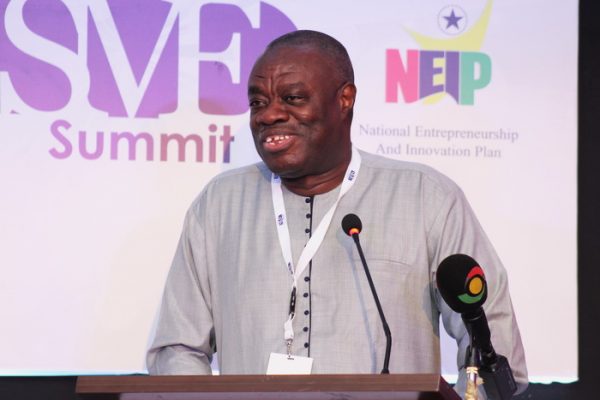Gov’t to implement entrepreneurship policy next year
- Posted on
- Comment
 The government is developing a comprehensive national entrepreneurship policy as part of its commitment to put young entrepreneurs at the centre of business in the country, the Minister of Business Development, Mr Ibrahim Mohammed Awal, has announced.
The government is developing a comprehensive national entrepreneurship policy as part of its commitment to put young entrepreneurs at the centre of business in the country, the Minister of Business Development, Mr Ibrahim Mohammed Awal, has announced.
He said the policy, upon approval by Cabinet next year, would be implemented from the first quarter of 2018.
Mr Awal made this known at the 4th African Small and Medium Enterprises (SME) summit in Accra on Wednesday.
The event, held on the theme, “Micro-multinationals, growing SMEs through digital technologies,” brought together business leaders, policymakers and academia, to discuss new trends in the business world, best practices and how businesses could be innovative.
The African SME Organisation, in collaboration with the National Entrepreneurship and Innovation Plan (NEIP), organised the summit under the auspices of the Ministry of Business Development.
It was supported by Ecobank, the Pan African Bank, the China Europe International Business School (CEIBS), Uber, Busy, SIC Life and Graphic Business.
The Business Development Minister said the ministry would liaise with the Ministry of Finance and the World Bank, to hold stakeholder consultations with various ministries, departments and agencies (MDAs), to identify key areas and opportunities where young entrepreneurs could be supported to leverage.
Entrepreneurship culture
“There are a lot of opportunities in the areas of agribusiness, energy, education, health, construction, roads and information and communications technology (ICT), where we want to bring together young entrepreneurs to take advantage of, to expand and grow their businesses in the country,” Mr Awal said.
“We are committed to making sure that entrepreneurship culture is deepened in the next four years,” he added.
Read also: Potential of 2018 budget to transform economy – Researchers express mixed feelings
Adopt young entrepreneurs
Mr Awal said the government was ready to create a space and show commitment to making young people more successful in their businesses to help address unemployment in the country.
He, therefore, challenged business owners to adopt at least two talented entrepreneurs at their workplaces and mentor them to grow to become successful business leaders in the future.
“These young people from the universities who do their national service and attachment have the ideas and skills but they do not know where to go afterwards. Their ideas only need to be horned.
“Adopting two young people and nurturing them, we would have each year 1,000 young entrepreneurs and we must bear in mind that the future is for the young people between the ages of 18 and 36,” he stressed.
The minister expressed regret that there was no single Ghanaian company that made it to the list of 200 top businesses in Africa and said that narrative must change.
More funds to entrepreneurs
The Minister of Finance and Economic Planning, Mr Ken Ofori-Atta, who represented the Vice- President, Dr Mahamudu Bawumia, said across the world, entrepreneurs had led the way in the creation of jobs, wealth, pride and development.
“In Ghana, we have had several of such entrepreneurs who have braced all storms and made significant contributions to our economy and country,” he said, although he admitted that being an entrepreneur was challenging.
It was, therefore, for such reasons that President Nana Addo Dankwa Akufo-Addo created the Ministry of Business Development and launched the NEIP in July this year to empower young entrepreneurs and SMEs.
“To this end, the government in the 2017 budget allocated an equivalent of $10 million for the NEIP. In the 2018 budget as well, we committed $50 million to same.
“By these, we believe and hope that the African SME Organisation, the private sector implementation partner, will be able to leverage the seed money and increase the fund to $100 million,” he said.
The Finance Minister stated that the NEIP fund was to provide small businesses and start-ups with grants, soft loans and equity financing during their formative years to enable them to grow and create jobs.
Initiatives
Realising the importance of entrepreneurship and the energies of young people, Mr Ofori-Atta said the government had introduced several initiatives in the 2018 budget to make doing business in Ghana easier.
“These initiatives include the lowering of electricity tariffs, tax rebate for young entrepreneurs under the age of 35, the Planting for Food and Jobs programme, free SHS and many others,” he added.
For his part, the Executive Director of the African SME Organisation, Mr Yaw Asamoah, said it was time the country positioned itself as a favourable business destination in Africa.
He, therefore, stressed the need for Ghanaian businesses to strive to become global businesses that had values, standards and were idealistic, to make them more competitive globally.
-Graphic










 (Selorm) |
(Selorm) |  (Nana Kwesi)
(Nana Kwesi)